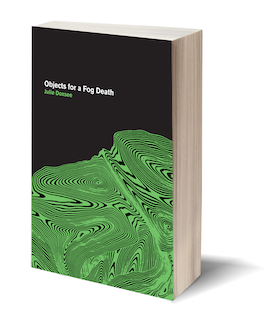Objects for a Fog DeathBy Julie DoxseeBlack Ocean |
 |
|---|
Reviewed by Robert Alan Wendeborn
Julie Doxsee's Objects for a Fog Death is not a good book to read in a dry, windy environment. It's also not good to read in a still, motionless environment, like a bathroom, or good to read in a confined space, like a car, even if the window is cracked. It should definitely not be read in a space that is dry, confined and seemingly motionless, like an airplane. It's a better book in the airport, than in the airplane. It is a book that requires many unknown faces passing in front of and behind the open book. It's a book that requires active water present at all times, and air, lots of air, that doesn't move. It's likely a good book to read in the shower instead of the bath, though this is something I'd never thought of doing until this book.
I wanted to shower with the book because Objects for a Fog Death has dynamic water present from the very beginning: ice cubes filling rooms, cheeks filling with tears, and snow. There are very few poems in the book that don't include imagery of, or visceral reactions to, water. The speaker, trying to connect to the other person in the poem, is lost in moving water of various states. The water is a force surrounding the speaker and her object, who are escaping to and from each other:
If lightning is just more
heat, where is the cycloneto entwine us until our
veins take down allthe trees between here
& seven days ago? If I writemy address on your wrist
the fog will wash it off, meltinto more ocean until
we are only more ocean.
The ever-present water not only keeps the two apart, hiding their location from each other, but brings them together, turning them into more water. As the fog dissolves the two into the ocean uniting them, it is also the source of their death.
All of the poems in the book possess an individual who engages in speech acts (the speaker) towards another (the other, the beloved, the object), absent and unspeakable individual (Maybe all but "Drowning Tour," which only has an unaddressed "he."). This is called "apostrophe." Now, not all cases of an individual speaking to another individual are considered apostrophe. The other must be absent and unspeakable. A way around this, a way to complicate this address so that it is not pure, overheard lyric, is to use the Romantic address that conflates the object, the you, with the reader, the always present you (a breaking of the fourth wall). The easiest example of this is Keats, "This Living Hand," which ends with the extending living/dead hand of Keats across time and space to the present reader for her examination. Doxsee's speaker doesn't break the fourth wall by addressing the reader, but she is very aware of the fact that there is a poem going on. The speaker and her object grasp with "verbs" and "climb around on/ what poems do."
The speaker in Objects for a Fog Death is not afraid of being unheard, so doesn't need to turn to the reader. The speaker is so unafraid that she even addresses the poem itself, as in "Halo":
On this day
I take a bite ofglow & become
part of you. I eata fireball in someone
else's wooden yard.When we fissure
smooth waterwith fishhooks
I am handed thelegal pad of words
you hide in...
It's as if she is aware of the fourth wall and actually closes herself in it, becoming a part of it, looking for the poem in the liquid "legal pad of words".
The end result of this diving into and being subsumed by water is a loss. It is a loss of bodies and all that's left is mind and language. The speaker, not a body, is talking to the poem or the very absent you, also not a body. Everything material, especially the speaker and her object, turns into the materiality of poetry: "...Swamped with short ghosts of/ breath, we return nightly to see how this/ thing to say could lead to an ocean." They, the speaker and her object, look for language to take them to an ocean, to a poem, a moving body of water, a place where the speaker and her object can both become objects in a fog death.
